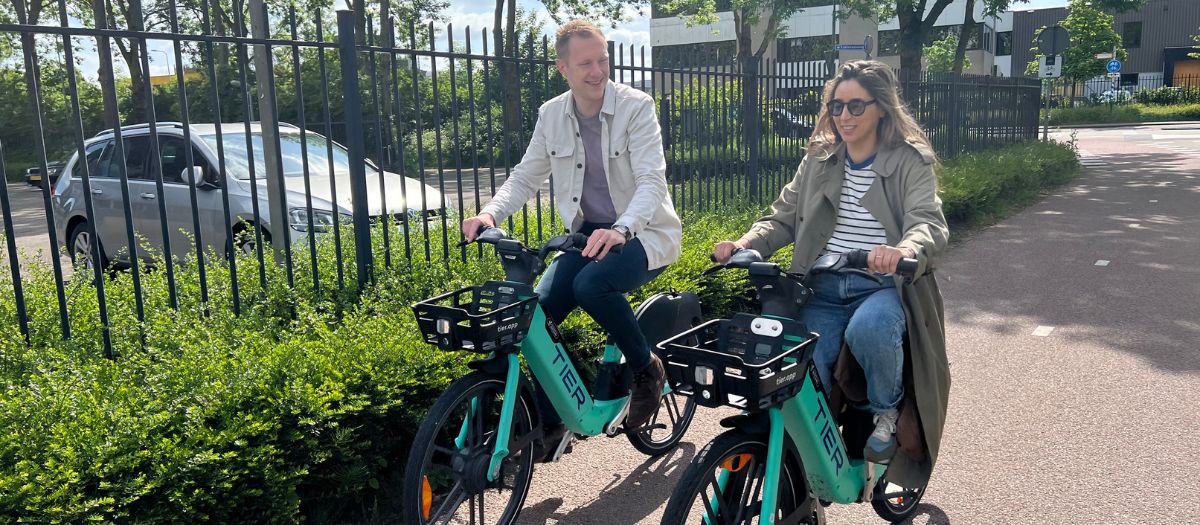Business parks on the city’s outskirts are often remote and difficult to reach by public transport. In June 2023, Lage Weide launched a three-year project in collaboration with TIER and Gaiyo. This allows employees and employers to get familiar with the whole system of shared mobility for a longer period of time. We spoke to Daan van Haarlem, project manager for Accessibility at ILW Parkmanagement Lage Weide at Lage Weide business park, about their challenges, ambitions and approach.
Ha Daan, from former volleyball player to an office job, that must have been a switch?
Yes, I got into it three years ago and I still really enjoy it. At ILW Parkmanagement Lage Weide, I am responsible for the infrastructure and logistics at the park, but also for behavioural change among companies and employees when it comes to their mobility.
Can you tell us something about business park Lage Weide. Where are we now?
You are now at the Lage Weide business park in Utrecht. It is home to 800 companies and employs more than 18,000 people. The urban supply of the whole of Utrecht is managed from this area. Years ago, the park was on the outskirts of Utrecht, but with the growth of surrounding towns and districts such as Maarssen, Vleuten and Leidsche Rijn, we have now grown more towards the city centre.
What challenges do you face as a business park?
As the city has grown, investment in accessibility at Lage Weide has fallen behind. Especially for employees of distribution companies located in the far corners of the business park, this can be a major challenge. As there is no good bus connection which means they have to walk 20-30 minutes to the nearest station or take the car, which is not a desirable option. Lage Weide is already full of cars every day as there are big traffic jams especially during rush hour.
Can you tell a bit more about the project?
We started a project together with Gaiyo, the province of Utrecht and TIER to get employees of companies located at Lage Weide to cycle more to and from work. To this end, they can use e-bikes from TIER for three years, which they can find, book and use via the Gaiyo App.
Because we are in close contact with all the companies, we also know what problems they encounter. Lage Weide is very large and the bus does not reach every corner of the site. The last mile from the three stations was missing, so many employees of companies on our site chose the car instead of more sustainable travel options.
Together with the municipality of Utrecht, TIER and Gaiyo, we have joined forces and placed bike hubs with plenty of e-bikes at various places in the park, which can be used free of charge through the Gaiyo App. This is being well used.
We are the first business park in the Netherlands to provide unlimited bicycle rides to company employees. This has not been done on such a large scale in any region before.
Do you already have concrete data or insights on the impact of the project on commuting and CO2 emissions in the region? Are there any specific changes been noticed in participants’ mobility patterns since the start of the project?
It is a little too early to say anything about that; the project will take three years and we started in June 2023. We have big plans. Our ambition is to replace 5,000 cars with other forms of sustainable transportation by the end of next year (2025). So far, the project has been a great success. After only four months, we have already achieved the target of having 175 users, travelling to and from the office by bike at least three times a week. We are now at 2,500 trips per month. The number of rides is expected to increase further in the spring.
What do employees think?
Everyone loves it, perhaps partly because the bikes are provided, but the reactions are very positive. Travel time to Lage Weide is shortened by the TIER e-bike and employees are much more likely to actually take the bike. In addition, especially in the early and late hours, when the distribution centres are in full swing, it is a sustainable solution for getting to and from work. And on the other hand, companies are happy with employees coming by bike; a vital and healthy form of travel. A win-win situation!
What advice would you give to other business parks?
Being very close to the companies and investing a lot of time in communication. Listening to the businesses and seeing what the problems are. A business park needs organisational capacity in the form of park management to tackle this properly, of which the shared e-bikes are a great example.

